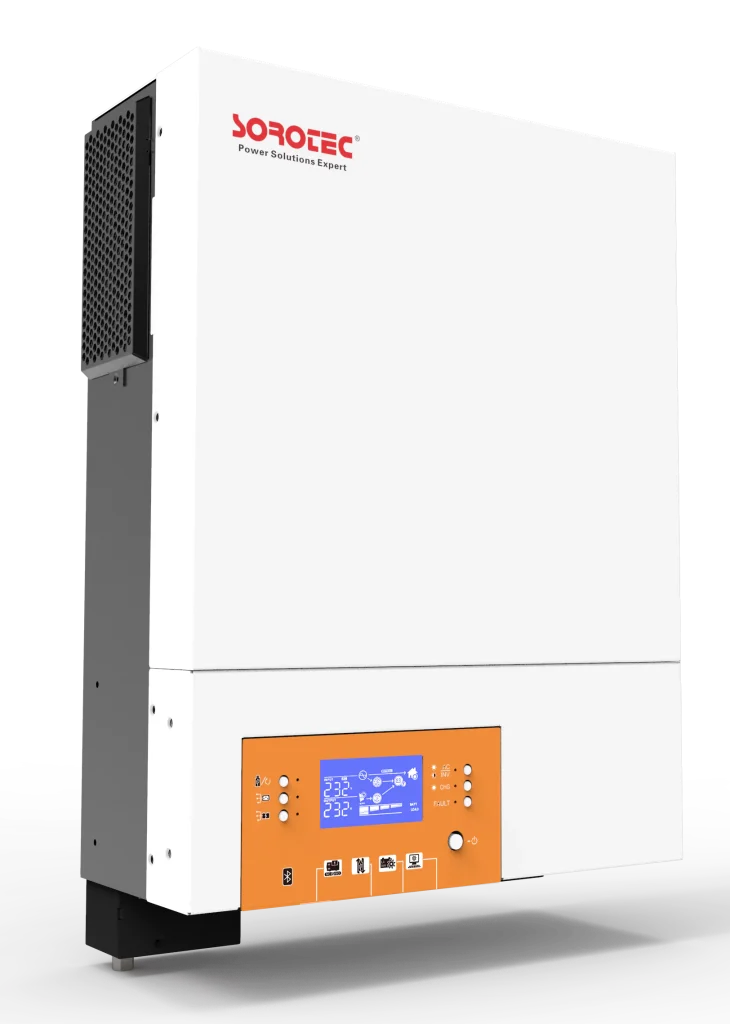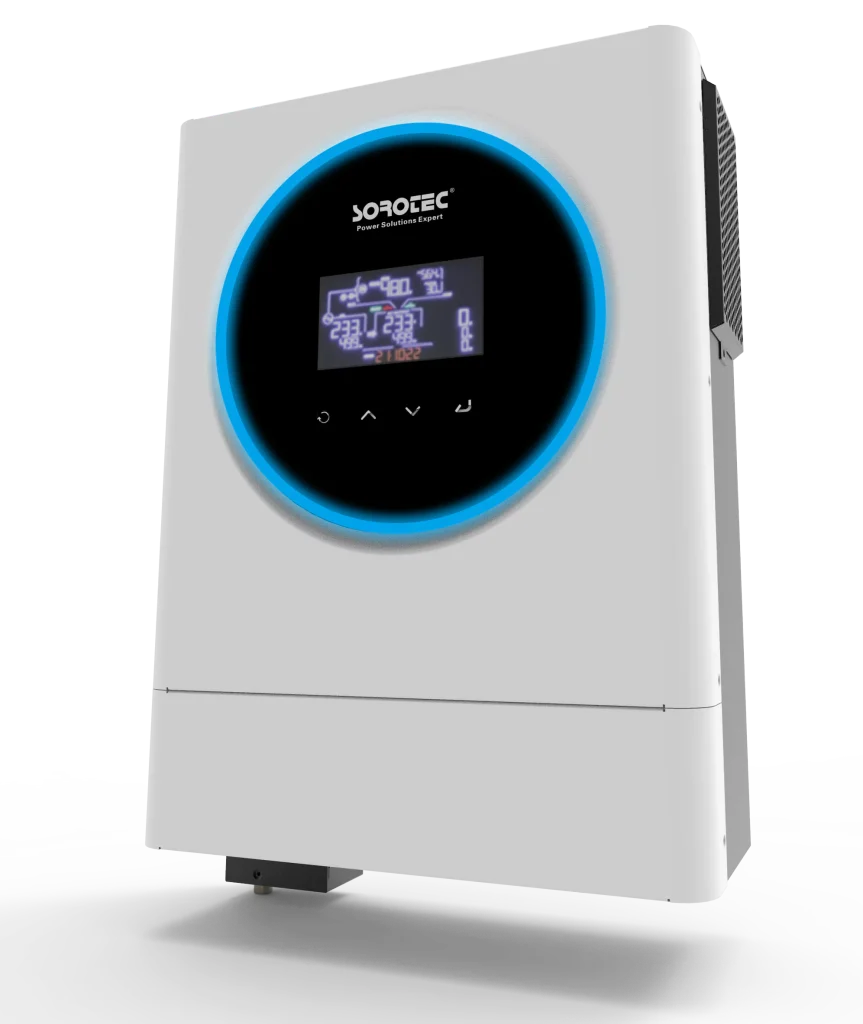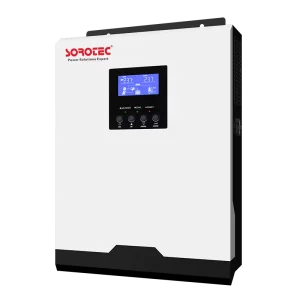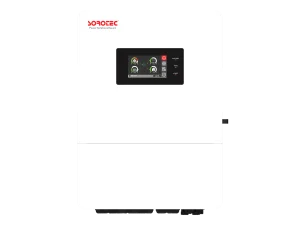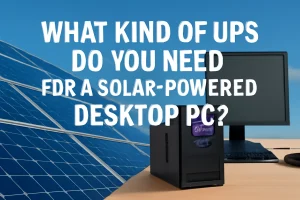Solar power is popular these days. Choosing the right solar inverter is a big deal because it’s like the heart of your solar setup. It controls how well your energy is grabbed, saved, and used. Two main options are hybrid solar inverters and off-grid solar inverters. But which one is best for your needs?
This guide looks at what makes these inverters different, their benefits, and where they work best. We’ll also check out SOROTEC, a top company known for making strong and adaptable inverter solutions.
Understanding Off-Grid Solar Inverters
What Is an Off-Grid Inverter?
An off-grid solar inverter lets your solar system run without the electric grid. It turns direct current (DC) from solar panels into alternating current (AC). This powers your home or business without any help from utility lines.
How It Works
Solar panels create DC power. This power goes into batteries for storage. The off-grid inverter takes energy from those batteries to make AC power for things like lights or fridges. It’s all about being independent, with no grid at all.
Benefits of Off-Grid Inverters
- Total Independence: Perfect for places with no grid, like far-off cabins or farms.
- Emergency Backup: Great for areas with storms or frequent power outages.
- No Grid Hassles: You don’t have to follow utility rules or deal with net metering.
Drawbacks of Off-Grid Inverters
- Need for Batteries: Big batteries are a must, and they cost a lot upfront.
- Hard to Expand: Adding more power later means buying extra batteries or equipment.
- No Grid Backup: Cloudy days or long nights might leave you short on power.
SOROTEC Solutions
SOROTEC’s off-grid inverters, like the REVO VM III-T and REVO VP Series, are built tough. They come with neat features:
- Wide DC input range for flexibility.
- Smart controls for two outputs.
- Dustproof design for harsh places.
- Option to work without batteries.
- Support for parallel setups and WiFi monitoring.
Understanding Hybrid Solar Inverters
What Is a Hybrid Inverter?
A hybrid inverter is a smart tool. It blends the best parts of grid-tied and off-grid systems. You can use solar power during the day, store extra in batteries, and pull from or send power to the grid when needed.
How It Works
Hybrid inverters manage power from solar panels, batteries, and the grid. They charge batteries with solar or grid energy. They also keep things running during peak times or power outages, making sure everything works smoothly.
Benefits of Hybrid Inverters
- Grid Link: Use grid power when needed or sell extra solar power back.
- Smart Savings: Save money by using cheap grid power during off-peak hours.
- Easy to Grow: Add batteries later or make your system bigger with less hassle.
- Simple Monitoring: Check your system on your phone with WiFi or apps.
Drawbacks of Hybrid Inverters
- Higher Cost: They’re pricier because of their advanced tech.
- Grid Rules: You might need permits to connect to the utility grid.
SOROTEC Hybrid Solutions
SOROTEC’s hybrid inverters, like the REVO HES, REVO HMT, and REVO HESS, are made for homes and businesses. They have cool features:
- IP65-rated for outdoor use in tough weather.
- LCD touch screens with many language options.
- Smart CT function to stop power from flowing back to the grid.
- Two smart load ports for better control.
- Peak/valley charging to lower your electric bill.
- WiFi monitoring and easy online updates.
Key Comparison: Hybrid vs Off-Grid
| Feature | Hybrid Inverter | Off-Grid Inverter |
| Grid Connectivity | Yes, connects to the grid | No, fully independent |
| Battery Requirement | Optional, but works better with batteries | Batteries are a must |
| Flexibility | High, switches between grid and solar | Low, only uses solar and batteries |
| Smart Features | Time-based charging, app controls | Simple battery monitoring |
| Cost | Medium to high, based on setup | Medium, but batteries add big costs |
| Ideal Use | City or suburb homes, backup power | Remote cabins, telecom sites, farms |
How to Choose: Key Decision Factors
1. Your Location & Grid Access
Live in a city or suburb with steady electricity? A hybrid inverter is great. It lets you use the grid as a backup and save cash. But if you’re in a remote spot, like a mountain cabin or an island with no grid, go for an off-grid inverter. It keeps you powered without relying on anyone.
2. Power Consumption Profile
If your home uses simple stuff like lights or a small fridge, an off-grid system might do the trick. But if you run big things like air conditioners, washers, or factory tools, a hybrid inverter like SOROTEC’s REVO HMT is better. It can pull grid power when your solar or batteries aren’t enough.
3. Budget vs Return
Hybrid systems cost more upfront, but they save money over time. You can use cheap grid power or sell extra solar power. Off-grid systems might be cheaper to start, but batteries add up fast to keep power steady.
4. Monitoring & Control Needs
SOROTEC’s hybrid inverters have cool tech like WiFi, RS485, and CAN ports. You can check your system on your phone, which is awesome for tech fans or businesses needing close control. Off-grid inverters have simpler monitoring, which might be okay for basic setups.
5. Future Expansion
With hybrid inverters like the REVO VM IV PRO-T, you can start small and grow later. They support parallel setups, three-phase power, and smart load controls. Off-grid systems are tougher to expand. You might need to redo a lot to add more power.
Why SOROTEC?
SOROTEC has been making power gear for nearly 20 years. They’re a trusted name in solar inverters and energy storage. Here’s why they’re awesome:
- Lots of Options: They make off-grid, hybrid, and energy storage systems.
- Proven Quality: Their gear works well in projects in Asia, Europe, and Africa.
- Custom Builds: They offer OEM/ODM services for private labels or big jobs.
- Smart Features: Peak-load controls, WiFi updates, and CT functions make their inverters stand out.
Whether you’re a homeowner looking for energy freedom or a business needing reliable power, SOROTEC has an inverter for you.
Conclusion
Choosing between a hybrid and off-grid solar inverter depends on where you are, how much power you need, your budget, and your future plans. Off-grid inverters give you total freedom, great for remote places. Hybrid inverters offer flexibility, grid backup, and smart savings for city or suburb homes.
No matter what you pick, a top-notch inverter from SOROTEC keeps your solar system running great for years.
FAQs
Q1: Can a hybrid solar inverter work without batteries?
A: Yes! SOROTEC models like the REVO VM IV PRO-T can run without batteries. This makes them super flexible for starting small and adding storage later.
Q2: What’s the main advantage of hybrid inverters over off-grid ones?
A: Hybrid inverters connect to the grid. You can sell extra power, use grid backup during outages, and save with off-peak rates.
Q3: Are SOROTEC inverters certified for international use?
A: Totally! SOROTEC’s products meet standards like CE, EMC, and LVD. They’re safe and ready for use worldwide.


